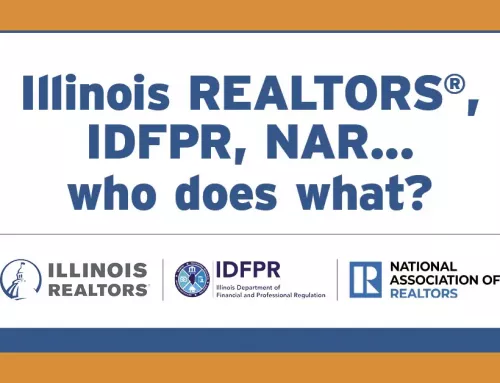A recent client of Erika Villegas lost $35,000 in equity when selling his home near Midway Airport because she believes the appraiser discriminated because of his race or the neighborhood he lived in.
“We all make mistakes, and sometimes, they are in a rush,” says Villegas, designated managing broker at RE/MAX in The Village, Oak Park.

The home listed at $310,000, but her client dropped the price to $290,000 to sell it faster so he could buy his dream home. However, the home only appraised for $255,000 with comparable homes very similar to it selling for $290,000.
“We tried to fight it by writing a letter of dispute and sent the list of comparables,” she adds.
The appraiser refused to change anything. The owner had to sell the house to move on but lost a big chunk of his equity.
“Someone just robbed $35,000 from my clients. It gets me worked up,” Villegas states. “This appraiser is not fully aware of what is happening to this family just because he thinks he’s right.”
She’s seeing the mistakes and discrimination more often in the past year from the entire 16 years she has been in the profession. She believes the discrimination could be lessened if more diverse appraisers came into the profession.
“Ninety percent of the appraisers I meet are white men. But we need to have women, Latinos, African-Americans, and others,” she comments.
Trying to fix the problem
Illinois REALTORS® formed a Discriminatory Appraisal Task Force to look into the topic and whether a person’s race has any impact on appraisals and values. The organization also commissioned a study from a professor affiliated with the University of Chicago to look at data on the topic. The study, released in October, definitively revealed that race does play a part.
For instance, neighborhood homogeneity seems to be rewarded by appraisers, while white mortgage seekers were more likely to get their mortgages denied if they lived in neighborhoods with more people of color.
Read more about the Illinois REALTORS®’ task force, its members and the research findings below.

Paul Brown, an appraiser and member of the task force, believes an education piece could help. Everyone from the appraiser to all parties involved in the transaction need to be informed about unconscious bias and the Fair Housing rules. Appraisers are bound by the Fair Housing Act to not discriminate based on race, national origin, gender, or religion, just like REALTORS®.
“Also, appraisals should not reflect market hype,” says Brown, Certified Residential Real Estate Appraiser at Corrie Appraisal & Consulting, Charleston, and instructor in the School of Business at Eastern Illinois University. “The envelope of prices has been pushed and pushed in this market the past 18-24 months. Many times, homes in different conditions are used as comparable sales. It doesn’t support the contract price.”
He emphasizes that contract price and appraised value are different things. What a buyer is willing to pay for a home, especially lately due to low inventory, may be different than what a lender is willing to lend on a home.
“When we have a very limited supply of houses, the bidding wars happen. It doesn’t mean that the house will appraise for the contract price,” according to Brown, who serves as CEO of the Central Illinois Board of REALTORS®.
Pushing ahead to new diverse appraisers
In 2020, the Appraiser Diversity Initiative (ADI) was launched by the Appraisal Institute (headquartered in Chicago), Fannie Mae, and the National Urban League. Freddie Mac joined as a core partner in 2021. The initiative helps recruit more appraisers of color and women. The Institute’s Education and Relief Foundation offers the Minorities and Women Course Scholarship Program. The institute is also developing a 5-hour course focused on addressing unconscious biases in appraisals.

As of the middle of December 2021, more than 100 scholarships have been awarded to help pay for classes and test fees to those across the country with seven in Illinois.
“Appraisal is one piece of a larger ecosystem to look at when it comes to housing issues,” says Rodman Schley, president of the institute. “Appraisal groups are working alongside consumer groups, real estate brokers and agents, banks, government agencies, think tanks, and others to explore where housing inequities may stem from and what combination of solutions should be considered.”
He believes efforts, such as the HUD Interagency Task Force created by President Biden’s administration, should include adjoining mortgage processing issues such as lender “reconsideration of value” and appraisal appeal processes as well as creative approaches to financing underserved markets.

Jake Williamson, vice president, single-family collateral risk management of Fannie Mae, believes that “many factors can contribute to potential bias in appraisals. But having an appraisal workforce that better represents the communities where they work could instill more confidence in the process and mitigate bias,” he adds.
Becoming an appraiser can be tough
The pathway to become a certified appraiser is not easy, Brown says.
“The education piece isn’t bad, but the supervision requirement or apprenticeship environment is steep,” he adds.
It can be hard for a company to take on that responsibility to train, pay the apprentice a living wage, and assume the liability at the same time while knowing there’s a very good chance you are training your future competition, he says.

Marcus Knight of Chicago received one of the ADI scholarships, which covered the three appraisal courses and three proctored exams, valued at about $1,200.
In Illinois, an appraiser needs 1,500 hours of experience – 500 of those being supervised – to become certified. He got his license in August 2020, but didn’t start to do appraising under a supervisor until April 2021.
It was hard for him to find a supervisor, which was his primary barrier to getting started. But he reached out to the National Urban League Regional Entrepreneurship Center and Fannie Mae. Within two weeks, they connected him with a firm and a supervisor.
Knight continues to work full-time at his job with non-profits while still training with his supervisor in appraisals.
“The scholarship’s whole purpose is to get people into the field. It’s not about holding your hand,” he says. “However, they will provide support to you. I can talk with them about any issues.”
He adds that as a trainee he has learned to always be cautious. He also has learned that appraisers, especially in Chicago, can be challenged by not having expertise in a certain geographic area.
“Many outsiders don’t understand the dynamics of the market area,” he adds.
Knight lives in Chatham but grew up by Humboldt. He knows the areas around him by walking, knowing the houses, and knowing the people.
“As a human being and an appraiser, I don’t want to accuse anyone of anything,” Knight adds. “But there have been intense studies on bias. I do know that a lot of appraisers worry about being accused of being bias.”
Doing your due diligence

Tony Hardy, a REALTOR®, has experienced appraisal discriminatory practices against himself.
“When an appraiser decides that the value isn’t there for some reason, it does pull wealth out the community and out of that family,” says Hardy, executive director of Multi-Family Investment Advisers at Keller Williams ONEChicago, and president of the South Side Community Investors Association.
When he and his wife tried to refinance their home in Kenwood just recently to get rid of the mortgage insurance, he believes the appraiser didn’t give them the value it truly was worth based on bias.
“It’s one of the most non-segregated neighborhoods in Chicago. My next-door neighbors are from Ireland,” Hardy states. “They have keys to my house, and vice versa. We are one and a half blocks from President Obama,” Hardy states.
The strange fact for him is that this appraiser didn’t use any sales comparables of properties in Kenwood. He used comparables from four blocks away, a completely different market. That market is 99 percent African-American, he comments.
“I believe the appraisal was so low because I am African-American,” he says. “It’s pretty obvious that this is a black house from what we have in it.”
Hardy called the mortgage company to complain and gave the information about comparables located nearby that weren’t used for his appraisal. “They told me that they believe the appraiser, and they will stick with him,” he adds.
“Appraisers work to protect the bank and the lenders. That’s where their loyalty lies,” he adds. “The role of the appraiser is critical, even in commercial transactions, where you are dealing with $200 million or more.”
Illinois REALTORS® Discriminatory Appraisal Task Force sheds light on appraisal bias

In 2021, an Illinois REALTORS® task force took a closer look at the topic of potential racial bias in home appraisals. Could a homeowner’s race result in a lower appraised value compared to a similar home owned by someone who was not a minority?
The answer: race potentially DOES play a key role in the rejection of home loan applications and appraised values of homes, according to research commissioned by Illinois REALTORS® and conducted by Dr. Marshall Jean, Assistant Instructional Professor of Sociology at the University of Chicago.
Find the full report, “Color and Collateral: Examining Individual and Neighborhood Effects of Race on Housing Valuation and Mortgage Lending” at www.IllinoisRealtors.org/Appraisals, but here are some key findings:

At the Illinois REALTORS® Fall Business Meetings, the Business Issues Forum hosted a panel discussion with members of the Discriminatory Appraisals Task Force and University of Chicago researcher, Dr. Marshall Jean. (L to R) Task Force Chair Lutalo McGee, member Paul Brown, Dr. Jean and Business Issues Forum Chair Sarah Ware.
Beyond the research, the task force – made up of REALTORS®, lenders and appraisers from around the state – has several other areas of focus including education and outreach and public policy.
Some of that ongoing work includes:
Task Force Members
Chair Lutalo McGee
Ani Real Estate, Chicago
2022 Illinois REALTORS® President Zeke Morris
EXIT Strategy/EMA Management, Chicago
Gideon Blustein
Illinois REALTORS®
Kristopher Anderson
Chicago Association of REALTORS®
Jasmine Baynes
LaShawn Brown
Natalie Carpenter
Betty Clayton
Brian Cunningham
Paulette Edwards
Sanina Ellison
Sarah Grossman
Tony Hardy
Andre Howard
Sybil Martin
Gwendolene Newton
Kuwana Norman
Paul Brown
Tony Pierce
Don Robinson
Ursula Shine
David Thomas
Erika Villegas
Sarah Ware
Gerald Wayne Williams
Christopher Posey
Bonita Harrison


















